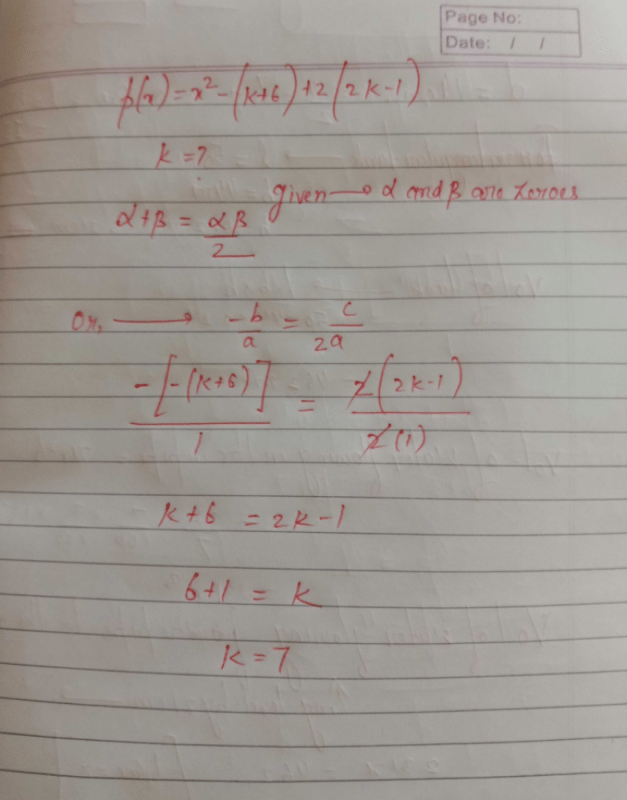Class 10 Exam > Class 10 Questions > If alpha and beta are the zeroes of the quadr...
Start Learning for Free
If alpha and beta are the zeroes of the quadratic polynomial p(x)=x^2-(k+ 6)+2(2k-1),then find the value of k if alpha plus beta is equal to alpha ×beta by 2?
Most Upvoted Answer
If alpha and beta are the zeroes of the quadratic polynomial p(x)=x^2-...

Community Answer
If alpha and beta are the zeroes of the quadratic polynomial p(x)=x^2-...
Explanation:
Let p(x) be a quadratic polynomial, then the general form of the quadratic polynomial is:
p(x) = ax^2 + bx + c
where a, b, and c are the coefficients of the polynomial.
Now, let alpha and beta be the roots of the given quadratic polynomial, then we have:
p(alpha) = 0 and p(beta) = 0
Using the factor theorem, we can write:
p(x) = (x - alpha)(x - beta)
Expanding the above expression, we get:
p(x) = x^2 - (alpha + beta)x + alpha * beta
Comparing the coefficients of the above equation with the given quadratic polynomial, we get:
a = 1, b = -(alpha + beta), and c = alpha * beta
Solution:
Given quadratic polynomial is:
p(x) = x^2 - (k * 6) * 2(2k - 1)
On comparing the coefficients, we get:
a = 1, b = -(alpha + beta) = (k * 6) * 2(2k - 1), and c = alpha * beta = 0.5(alpha + beta)
As alpha + beta = 2c, we get:
alpha + beta = 2 * 0.5(alpha + beta)
alpha + beta = alpha * beta
Substituting the value of b, we get:
(k * 6) * 2(2k - 1) = -(alpha + beta)
(k * 6) * 2(2k - 1) = -alpha - beta
Solving the above equation, we get:
k = 0 or k = 5/6
Therefore, the value of k is either 0 or 5/6.
Attention Class 10 Students!
To make sure you are not studying endlessly, EduRev has designed Class 10 study material, with Structured Courses, Videos, & Test Series. Plus get personalized analysis, doubt solving and improvement plans to achieve a great score in Class 10.

|
Explore Courses for Class 10 exam
|

|
Similar Class 10 Doubts
If alpha and beta are the zeroes of the quadratic polynomial p(x)=x^2-(k+ 6)+2(2k-1),then find the value of k if alpha plus beta is equal to alpha ×beta by 2?
Question Description
If alpha and beta are the zeroes of the quadratic polynomial p(x)=x^2-(k+ 6)+2(2k-1),then find the value of k if alpha plus beta is equal to alpha ×beta by 2? for Class 10 2024 is part of Class 10 preparation. The Question and answers have been prepared according to the Class 10 exam syllabus. Information about If alpha and beta are the zeroes of the quadratic polynomial p(x)=x^2-(k+ 6)+2(2k-1),then find the value of k if alpha plus beta is equal to alpha ×beta by 2? covers all topics & solutions for Class 10 2024 Exam. Find important definitions, questions, meanings, examples, exercises and tests below for If alpha and beta are the zeroes of the quadratic polynomial p(x)=x^2-(k+ 6)+2(2k-1),then find the value of k if alpha plus beta is equal to alpha ×beta by 2?.
If alpha and beta are the zeroes of the quadratic polynomial p(x)=x^2-(k+ 6)+2(2k-1),then find the value of k if alpha plus beta is equal to alpha ×beta by 2? for Class 10 2024 is part of Class 10 preparation. The Question and answers have been prepared according to the Class 10 exam syllabus. Information about If alpha and beta are the zeroes of the quadratic polynomial p(x)=x^2-(k+ 6)+2(2k-1),then find the value of k if alpha plus beta is equal to alpha ×beta by 2? covers all topics & solutions for Class 10 2024 Exam. Find important definitions, questions, meanings, examples, exercises and tests below for If alpha and beta are the zeroes of the quadratic polynomial p(x)=x^2-(k+ 6)+2(2k-1),then find the value of k if alpha plus beta is equal to alpha ×beta by 2?.
Solutions for If alpha and beta are the zeroes of the quadratic polynomial p(x)=x^2-(k+ 6)+2(2k-1),then find the value of k if alpha plus beta is equal to alpha ×beta by 2? in English & in Hindi are available as part of our courses for Class 10.
Download more important topics, notes, lectures and mock test series for Class 10 Exam by signing up for free.
Here you can find the meaning of If alpha and beta are the zeroes of the quadratic polynomial p(x)=x^2-(k+ 6)+2(2k-1),then find the value of k if alpha plus beta is equal to alpha ×beta by 2? defined & explained in the simplest way possible. Besides giving the explanation of
If alpha and beta are the zeroes of the quadratic polynomial p(x)=x^2-(k+ 6)+2(2k-1),then find the value of k if alpha plus beta is equal to alpha ×beta by 2?, a detailed solution for If alpha and beta are the zeroes of the quadratic polynomial p(x)=x^2-(k+ 6)+2(2k-1),then find the value of k if alpha plus beta is equal to alpha ×beta by 2? has been provided alongside types of If alpha and beta are the zeroes of the quadratic polynomial p(x)=x^2-(k+ 6)+2(2k-1),then find the value of k if alpha plus beta is equal to alpha ×beta by 2? theory, EduRev gives you an
ample number of questions to practice If alpha and beta are the zeroes of the quadratic polynomial p(x)=x^2-(k+ 6)+2(2k-1),then find the value of k if alpha plus beta is equal to alpha ×beta by 2? tests, examples and also practice Class 10 tests.

|
Explore Courses for Class 10 exam
|

|
Suggested Free Tests
Signup for Free!
Signup to see your scores go up within 7 days! Learn & Practice with 1000+ FREE Notes, Videos & Tests.

























